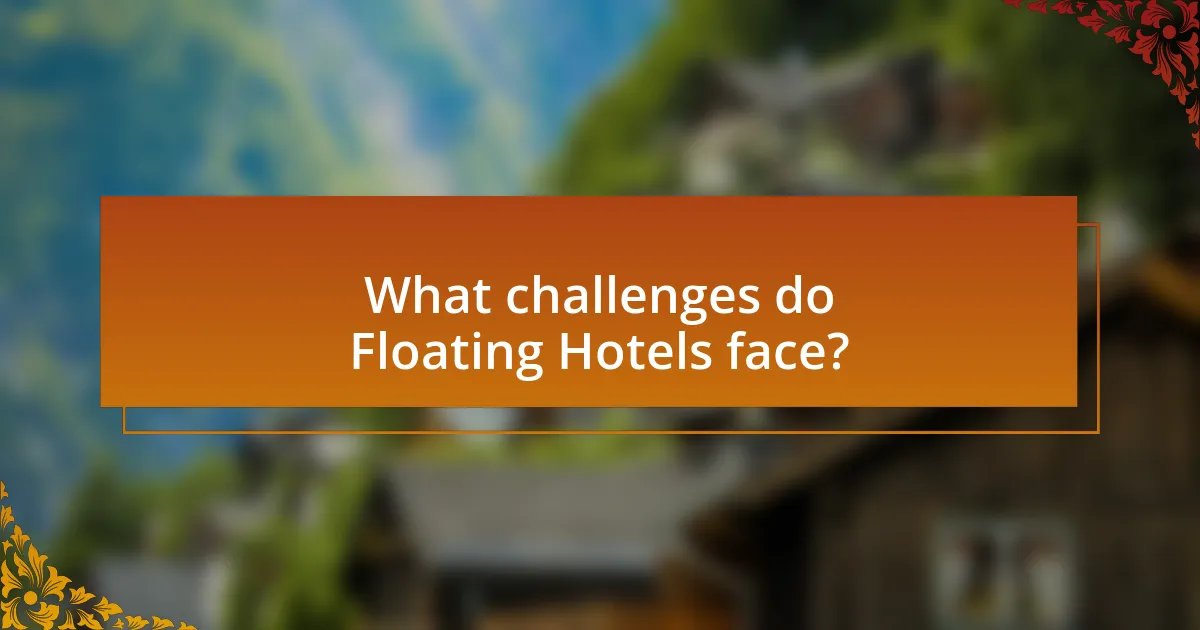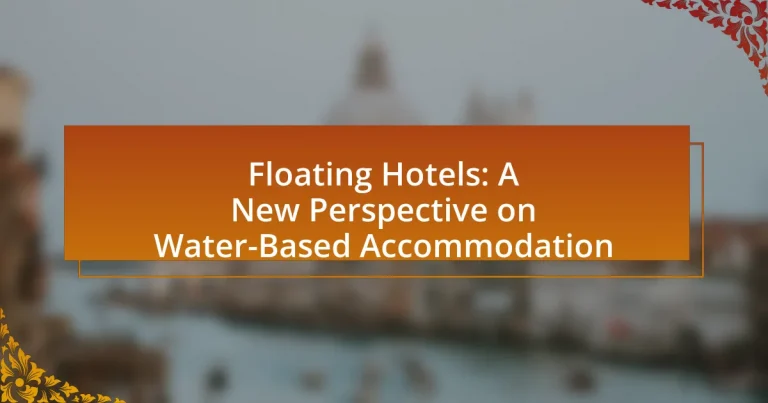Floating hotels represent a novel approach to accommodation, constructed on water bodies such as oceans, lakes, and rivers. These unique structures offer amenities comparable to traditional hotels while promoting sustainable tourism through minimal land use and eco-friendly practices. The article explores the distinct features of floating hotels, including their innovative designs, environmental considerations, and the growing consumer interest in unique travel experiences. It also addresses the challenges faced by floating hotels, such as regulatory compliance and operational logistics, while highlighting their economic impact on local communities and investment opportunities in this emerging sector.

What are Floating Hotels?
Floating hotels are unique accommodations built on water, designed to provide guests with a distinctive experience away from traditional land-based hotels. These structures can be anchored in various bodies of water, such as oceans, lakes, or rivers, and often feature amenities similar to those found in conventional hotels, including restaurants, spas, and recreational activities. The concept of floating hotels has gained popularity due to their ability to offer scenic views and a sense of tranquility, while also promoting sustainable tourism practices by minimizing land use.
How do Floating Hotels differ from traditional hotels?
Floating hotels differ from traditional hotels primarily in their location and structure, as they are built on water rather than on solid ground. This unique positioning allows floating hotels to offer distinctive views and experiences, such as direct access to aquatic activities and a serene environment that traditional hotels cannot provide. Additionally, floating hotels often incorporate sustainable technologies, such as solar panels and water recycling systems, to minimize their environmental impact, which contrasts with many traditional hotels that may not prioritize such eco-friendly practices.
What design features are unique to Floating Hotels?
Floating hotels are characterized by their buoyant structures, which allow them to rest on water surfaces while providing stability and comfort. Unique design features include modular construction that enables flexibility in layout and size, as well as eco-friendly materials that minimize environmental impact. Additionally, many floating hotels incorporate panoramic windows for unobstructed views of the surrounding water and landscapes, enhancing the guest experience. These hotels often utilize advanced anchoring systems to ensure safety and stability in varying water conditions, further distinguishing them from traditional land-based accommodations.
How do Floating Hotels address environmental concerns?
Floating hotels address environmental concerns by utilizing sustainable design and construction practices that minimize ecological impact. These hotels often incorporate renewable energy sources, such as solar panels and wind turbines, to reduce reliance on fossil fuels. Additionally, floating hotels are designed to have minimal footprint on marine ecosystems, often using eco-friendly materials and advanced waste management systems to prevent pollution. For example, some floating hotels feature systems that treat wastewater on-site, ensuring that no harmful substances are released into the surrounding water. This approach not only protects marine life but also promotes biodiversity by allowing natural habitats to thrive undisturbed.
Why are Floating Hotels gaining popularity?
Floating hotels are gaining popularity due to their unique appeal and innovative design that offers guests a distinctive experience on water. This trend is driven by increasing consumer interest in sustainable tourism, as many floating hotels utilize eco-friendly technologies and materials, reducing their environmental impact. Additionally, the allure of scenic waterfront views and the novelty of staying on water attract travelers seeking memorable vacations. According to a report by the Global Wellness Institute, the wellness tourism sector, which includes unique accommodations like floating hotels, is projected to grow significantly, indicating a shift in consumer preferences towards experiential travel.
What trends are driving the growth of Floating Hotels?
The growth of floating hotels is primarily driven by increasing demand for unique travel experiences and sustainable tourism. Travelers are seeking novel accommodations that offer immersive interactions with nature, and floating hotels provide a distinctive blend of luxury and environmental consciousness. Additionally, advancements in marine engineering and design have made it feasible to create comfortable, stable, and eco-friendly floating structures. The global trend towards sustainability is further supported by the rising interest in reducing carbon footprints, as many floating hotels utilize renewable energy sources and minimize land use. According to a report by the Global Sustainable Tourism Council, sustainable tourism is projected to grow by 25% annually, highlighting the increasing consumer preference for eco-friendly travel options.
How do Floating Hotels enhance the travel experience?
Floating hotels enhance the travel experience by providing unique accommodations that combine luxury with scenic views and direct access to water activities. These hotels often feature innovative designs that allow guests to enjoy panoramic vistas, creating a sense of tranquility and connection with nature. For instance, floating hotels like the Floating Seahorse in Dubai offer underwater rooms, allowing guests to observe marine life while enjoying modern amenities. This immersive experience is supported by the growing trend of eco-tourism, where travelers seek sustainable and novel lodging options that minimize environmental impact while maximizing enjoyment.

What types of Floating Hotels exist?
Various types of floating hotels exist, including luxury floating resorts, eco-friendly floating hotels, and houseboat-style accommodations. Luxury floating resorts often feature high-end amenities and services, catering to affluent travelers seeking unique experiences on water. Eco-friendly floating hotels prioritize sustainability, utilizing renewable energy sources and environmentally conscious designs to minimize their ecological footprint. Houseboat-style accommodations offer a more casual and intimate experience, allowing guests to enjoy the charm of living on water while providing basic comforts. Each type serves different market segments and preferences, contributing to the growing popularity of water-based lodging options.
How are Floating Hotels categorized?
Floating hotels are categorized primarily based on their design, functionality, and location. The main categories include luxury floating hotels, eco-friendly floating hotels, and functional floating hotels. Luxury floating hotels offer high-end amenities and services, often found in popular tourist destinations, while eco-friendly floating hotels focus on sustainability and minimal environmental impact, frequently located in natural settings. Functional floating hotels serve practical purposes, such as providing accommodation for workers in remote areas or offshore projects. This categorization reflects the diverse offerings and purposes of floating hotels in the evolving landscape of water-based accommodation.
What are the characteristics of luxury Floating Hotels?
Luxury floating hotels are characterized by their unique design, high-end amenities, and exceptional service. These hotels often feature spacious, well-appointed rooms with panoramic views, utilizing large windows and outdoor terraces to enhance the guest experience. Additionally, luxury floating hotels typically offer gourmet dining options, spa services, and recreational activities such as water sports or excursions, catering to the desires of affluent travelers.
The construction of these hotels often incorporates sustainable materials and advanced technology, ensuring environmental responsibility while providing comfort. For instance, many luxury floating hotels are equipped with solar panels and waste management systems, reflecting a commitment to eco-friendly practices.
Moreover, the exclusivity of location plays a significant role; these hotels are often situated in breathtaking natural settings, such as serene lakes or pristine coastlines, providing guests with a unique escape from traditional accommodations. The combination of these elements creates an unparalleled experience that defines luxury floating hotels.
What are the features of eco-friendly Floating Hotels?
Eco-friendly floating hotels feature sustainable design elements, renewable energy sources, and waste management systems. These hotels often utilize solar panels and wind turbines to generate energy, minimizing reliance on fossil fuels. Additionally, they incorporate eco-friendly materials in construction, such as recycled or locally sourced products, to reduce environmental impact. Advanced water filtration and recycling systems are commonly implemented to ensure responsible water usage and minimize pollution. Furthermore, eco-friendly floating hotels often promote biodiversity by integrating natural habitats and preserving local ecosystems, contributing to environmental conservation efforts.
What are some notable examples of Floating Hotels?
Notable examples of floating hotels include the Floating Hotel in Sweden, which features eco-friendly design and offers unique views of the surrounding nature. Another example is the Water Discus Hotel in Dubai, designed to be partially submerged underwater, providing guests with an underwater experience. Additionally, the Conrad Maldives Rangali Island includes luxurious overwater villas that exemplify the floating hotel concept. These hotels are recognized for their innovative architecture and immersive experiences, attracting travelers seeking unique accommodations.
Which Floating Hotels are considered the most innovative?
The most innovative floating hotels include the Floating Seahorse, the Arkup, and the WaterNest 100. The Floating Seahorse, located in Dubai, features underwater bedrooms and is designed to blend luxury with marine life observation. Arkup is a self-sustaining floating villa that utilizes solar energy and features a hydraulic anchoring system, allowing it to adapt to changing water levels. WaterNest 100, situated in Italy, is an eco-friendly floating hotel made from sustainable materials and designed to minimize environmental impact. These hotels exemplify advancements in design, sustainability, and luxury in the floating accommodation sector.
What unique experiences do these Floating Hotels offer?
Floating hotels offer unique experiences such as immersive marine life encounters, panoramic views of the surrounding water, and direct access to aquatic activities like snorkeling and kayaking. These accommodations often feature transparent floors or underwater rooms, allowing guests to observe marine ecosystems firsthand. Additionally, floating hotels frequently provide exclusive dining experiences with fresh seafood sourced from local waters, enhancing the connection to the aquatic environment. The combination of luxury amenities and the serene setting of being on water creates a distinctive atmosphere that cannot be replicated by traditional hotels.

What challenges do Floating Hotels face?
Floating hotels face several challenges, including environmental regulations, structural stability, and operational logistics. Environmental regulations can be stringent, requiring compliance with local laws regarding water quality and marine life protection. Structural stability is critical, as floating hotels must withstand waves, currents, and potential storms, necessitating advanced engineering solutions. Operational logistics also pose difficulties, as these hotels often require unique supply chains for food, water, and waste management, which can complicate day-to-day operations.
How do regulatory issues impact Floating Hotels?
Regulatory issues significantly impact floating hotels by dictating their operational feasibility, safety standards, and environmental compliance. These regulations can vary widely by location, affecting aspects such as construction permits, zoning laws, and maritime safety codes. For instance, in many jurisdictions, floating hotels must adhere to strict maritime regulations that govern their design and anchoring systems to ensure safety and stability on water. Additionally, environmental regulations may require floating hotels to implement measures that protect local ecosystems, such as waste management systems that prevent pollution. Compliance with these regulations is crucial for securing necessary permits and avoiding legal penalties, ultimately influencing the viability and profitability of floating hotel projects.
What are the safety concerns associated with Floating Hotels?
Safety concerns associated with floating hotels include stability, environmental impact, and emergency response capabilities. Stability is critical, as floating structures must withstand waves, wind, and potential flooding; inadequate design can lead to capsizing or structural failure. Environmental impact arises from potential pollution and disruption to marine ecosystems, particularly if waste management systems are not properly implemented. Emergency response capabilities are essential, as floating hotels may be remote and require efficient evacuation plans in case of emergencies such as fires or medical incidents. These concerns highlight the need for rigorous safety standards and regulations in the design and operation of floating hotels.
How do weather conditions affect the operation of Floating Hotels?
Weather conditions significantly impact the operation of floating hotels by influencing safety, guest comfort, and logistical operations. For instance, high winds and storms can pose risks to the structural integrity of floating hotels, leading to potential evacuations or service interruptions. Additionally, extreme temperatures can affect heating and cooling systems, impacting guest satisfaction. Rain and rough seas can hinder transportation to and from the hotel, complicating supply deliveries and guest access. Historical data indicates that floating hotels in regions prone to severe weather events often implement robust design features and operational protocols to mitigate these risks, ensuring safety and maintaining service quality.
What are the economic implications of Floating Hotels?
Floating hotels can significantly impact local economies by boosting tourism, creating jobs, and stimulating related industries. These establishments attract visitors seeking unique experiences, which can lead to increased spending in local businesses such as restaurants, shops, and recreational activities. For instance, a study by the World Tourism Organization indicates that tourism can contribute up to 10% of GDP in some regions, highlighting the potential economic benefits of floating hotels. Additionally, the construction and maintenance of floating hotels generate employment opportunities in various sectors, including hospitality, construction, and marine services, further enhancing economic growth.
How do Floating Hotels contribute to local economies?
Floating hotels contribute to local economies by generating tourism revenue, creating jobs, and promoting local businesses. These unique accommodations attract visitors seeking novel experiences, which increases spending in the area. For instance, a study by the World Tourism Organization indicates that tourism can account for up to 10% of a region’s GDP, with floating hotels enhancing this by offering exclusive amenities and experiences. Additionally, floating hotels often require local labor for construction and operation, thus providing employment opportunities. They also stimulate demand for local services, such as restaurants, shops, and transportation, further integrating into the economic fabric of the community.
What are the investment opportunities in Floating Hotels?
Investment opportunities in floating hotels include unique market positioning, eco-tourism appeal, and diversification of hospitality offerings. Floating hotels can attract high-end tourists seeking novel experiences, as evidenced by the growing trend in luxury travel, with the global luxury hotel market projected to reach $115 billion by 2027. Additionally, floating hotels can capitalize on waterfront locations that are often underutilized, providing a competitive edge in prime tourist destinations. The sustainability aspect of floating hotels also aligns with increasing consumer demand for eco-friendly accommodations, as 70% of travelers express a preference for sustainable travel options. These factors collectively present a compelling case for investment in floating hotels.
What should travelers consider when choosing a Floating Hotel?
Travelers should consider location, amenities, safety, and environmental impact when choosing a floating hotel. The location affects accessibility and views, while amenities such as dining options and recreational activities enhance the experience. Safety features, including stability and emergency protocols, are crucial for guest security. Additionally, the environmental impact of the floating hotel, including its sustainability practices and effects on local ecosystems, is increasingly important for eco-conscious travelers. These factors collectively influence the overall quality and enjoyment of the floating hotel experience.
What amenities should be prioritized in a Floating Hotel selection?
In a Floating Hotel selection, amenities that should be prioritized include stability, comfort, and access to water activities. Stability is crucial to ensure guest safety and comfort, as floating structures must withstand water movement. Comfort amenities such as spacious rooms, quality bedding, and climate control enhance the overall guest experience. Access to water activities like kayaking, snorkeling, or diving is essential, as it aligns with the unique appeal of staying on water. These amenities not only meet guest expectations but also enhance the attractiveness of floating hotels as a distinctive accommodation option.
How can travelers ensure a sustainable experience at Floating Hotels?
Travelers can ensure a sustainable experience at Floating Hotels by choosing accommodations that prioritize eco-friendly practices, such as using renewable energy sources and implementing waste reduction strategies. Many floating hotels utilize solar panels and rainwater harvesting systems, which significantly reduce their environmental impact. Additionally, travelers should engage in responsible tourism by respecting local ecosystems, minimizing water usage, and supporting local communities through sustainable dining and activities. Research indicates that eco-conscious travelers are more likely to choose accommodations that align with their values, thus promoting sustainability in the hospitality industry.


